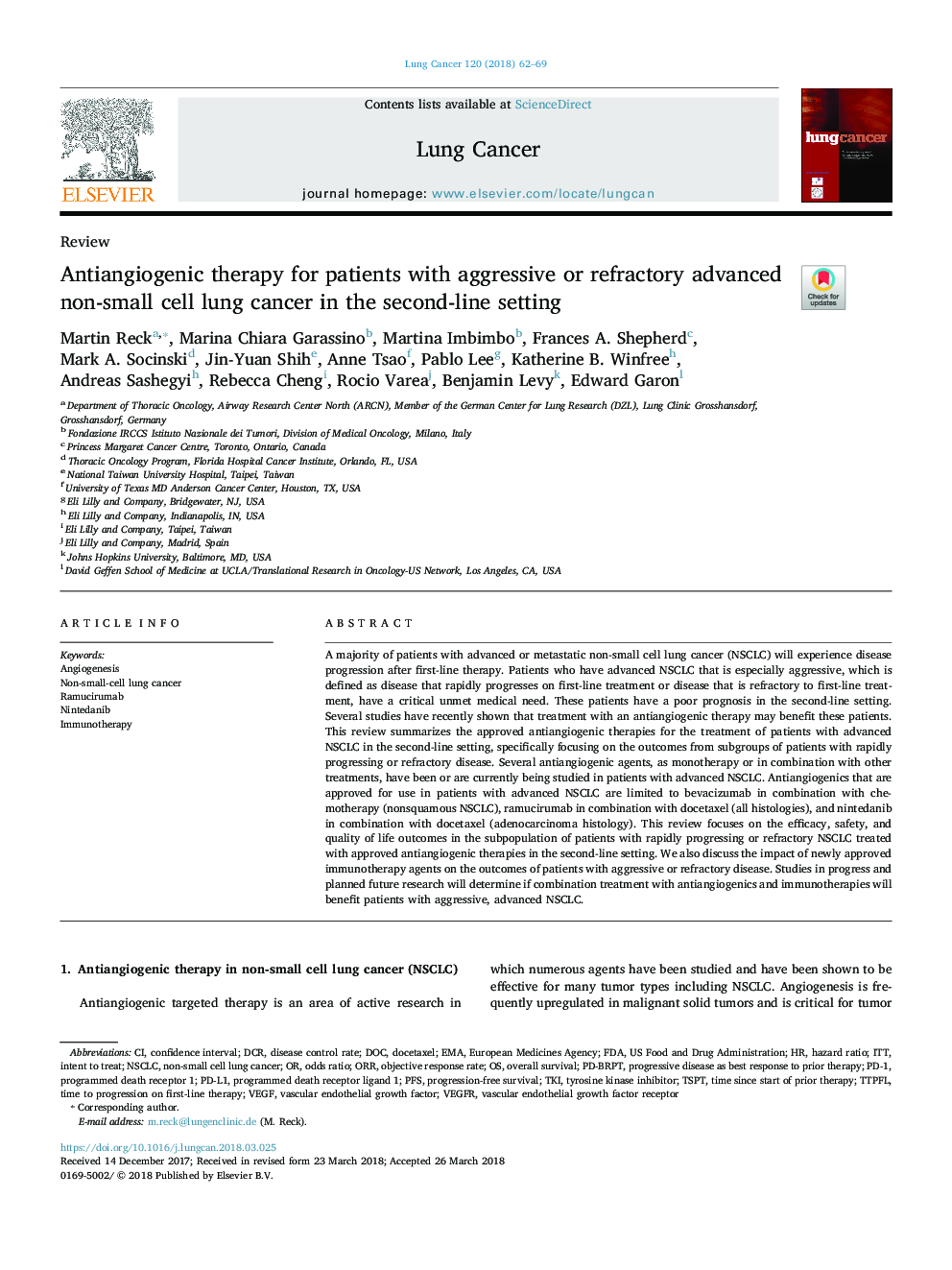| کد مقاله | کد نشریه | سال انتشار | مقاله انگلیسی | نسخه تمام متن |
|---|---|---|---|---|
| 8453794 | 1547946 | 2018 | 8 صفحه PDF | دانلود رایگان |
عنوان انگلیسی مقاله ISI
Antiangiogenic therapy for patients with aggressive or refractory advanced non-small cell lung cancer in the second-line setting
دانلود مقاله + سفارش ترجمه
دانلود مقاله ISI انگلیسی
رایگان برای ایرانیان
کلمات کلیدی
FDADCRNintedanibRamucirumabEMAPD-L1ORRDOCPD-1TKIVEGFRProgrammed death receptor 1PFs - PF هاAngiogenesis - آنژیوژنزEuropean Medicines agency - آژانس دارویی اروپاUS Food and Drug Administration - اداره غذا و داروی ایالات متحدهimmunotherapy - ایمونوتراپیITT - اینجاprogression-free survival - بقا بدون پیشرفتoverall survival - بقای کلDocetaxel - داکتاکسلNon-small-cell lung cancer - سرطان ریه غیر سلولی کوچکNSCLC - سرطان ریوی غیر سلول کوچکNon-small cell lung cancer - سرطان غیر سلول کوچک ریهconfidence interval - فاصله اطمینانVascular endothelial growth factor - فاکتور رشد اندوتلیال عروقیVascular Endothelial Growth Factor (VEGF) - فاکتور رشد اندوتلیال عروقی (VEGF)Intent to treat - قصد درمانTyrosine kinase inhibitor - مهار کننده تیروزین کینازobjective response rate - نرخ پاسخ هدفDisease control rate - نرخ کنترل بیماریhazard ratio - نسبت خطرodds ratio - نسبت شانس هاvascular endothelial growth factor receptor - گیرنده فاکتور رشد اندوتلیال عروقی
موضوعات مرتبط
علوم زیستی و بیوفناوری
بیوشیمی، ژنتیک و زیست شناسی مولکولی
تحقیقات سرطان
پیش نمایش صفحه اول مقاله

چکیده انگلیسی
A majority of patients with advanced or metastatic non-small cell lung cancer (NSCLC) will experience disease progression after first-line therapy. Patients who have advanced NSCLC that is especially aggressive, which is defined as disease that rapidly progresses on first-line treatment or disease that is refractory to first-line treatment, have a critical unmet medical need. These patients have a poor prognosis in the second-line setting. Several studies have recently shown that treatment with an antiangiogenic therapy may benefit these patients. This review summarizes the approved antiangiogenic therapies for the treatment of patients with advanced NSCLC in the second-line setting, specifically focusing on the outcomes from subgroups of patients with rapidly progressing or refractory disease. Several antiangiogenic agents, as monotherapy or in combination with other treatments, have been or are currently being studied in patients with advanced NSCLC. Antiangiogenics that are approved for use in patients with advanced NSCLC are limited to bevacizumab in combination with chemotherapy (nonsquamous NSCLC), ramucirumab in combination with docetaxel (all histologies), and nintedanib in combination with docetaxel (adenocarcinoma histology). This review focuses on the efficacy, safety, and quality of life outcomes in the subpopulation of patients with rapidly progressing or refractory NSCLC treated with approved antiangiogenic therapies in the second-line setting. We also discuss the impact of newly approved immunotherapy agents on the outcomes of patients with aggressive or refractory disease. Studies in progress and planned future research will determine if combination treatment with antiangiogenics and immunotherapies will benefit patients with aggressive, advanced NSCLC.
ناشر
Database: Elsevier - ScienceDirect (ساینس دایرکت)
Journal: Lung Cancer - Volume 120, June 2018, Pages 62-69
Journal: Lung Cancer - Volume 120, June 2018, Pages 62-69
نویسندگان
Martin Reck, Marina Chiara Garassino, Martina Imbimbo, Frances A. Shepherd, Mark A. Socinski, Jin-Yuan Shih, Anne Tsao, Pablo Lee, Katherine B. Winfree, Andreas Sashegyi, Rebecca Cheng, Rocio Varea, Benjamin Levy, Edward Garon,